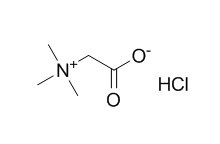Betaine hydrochloride
Betaine hydrochloride is a natural compound found in many foods and also an active methyl-donor which can maintain normal DNA methylation patterns, which has anti-hypoxic, hepatoprotective, sedative, antipyretic and analgesic effects. Betaine hydrochloride can increase the secreting of thyroxine (T3) and insulin and regulate the metabolism of organism by the hormones, thus it prompts fish growth and also improves intestine figuration.
Inquire / Order:
manager@chemfaces.com
Technical Inquiries:
service@chemfaces.com
Tel:
+86-27-84237783
Fax:
+86-27-84254680
Address:
1 Building, No. 83, CheCheng Rd., Wuhan Economic and Technological Development Zone, Wuhan, Hubei 430056, PRC
Providing storage is as stated on the product vial and the vial is kept tightly sealed, the product can be stored for up to
24 months(2-8C).
Wherever possible, you should prepare and use solutions on the same day. However, if you need to make up stock solutions in advance, we recommend that you store the solution as aliquots in tightly sealed vials at -20C. Generally, these will be useable for up to two weeks. Before use, and prior to opening the vial we recommend that you allow your product to equilibrate to room temperature for at least 1 hour.
Need more advice on solubility, usage and handling? Please email to: service@chemfaces.com
The packaging of the product may have turned upside down during transportation, resulting in the natural compounds adhering to the neck or cap of the vial. take the vial out of its packaging and gently shake to let the compounds fall to the bottom of the vial. for liquid products, centrifuge at 200-500 RPM to gather the liquid at the bottom of the vial. try to avoid loss or contamination during handling.
Research Square2022, rs.3.rs-1948239
Evid Based Complement Alternat Med.2018, 2018:4259603
Microorganisms.2021, 9(12):2514.
Neurotox Res.2020, 38(1):163-174.
Virulence.2018, 9(1):588-603
Int J Mol Sci. 2014, 15(5):8443-57
Onco Targets Ther.2017, 10:3467-3474
Mol Neurobiol.2022, 02873-9.
Front Pharmacol.2019, 10:1355
Sci Adv.2018, 4(10)
Related and Featured Products
Journal of Fisheries of China, 2003, 27(6):564-9.
Growth-promoting mechanism by betaine hydrochloride in Colossoma brachypomum.[Reference:
WebLink]
This research was conducted to approach growth-promoting mechanism by Betaine hydrochloride in Colossoma brachypomum fingerlings with average initial weight 83.14±15. 36g during October to December, 1997.
METHODS AND RESULTS:
The fish was fed for 60d under the conditions of circulation, filtration and controled temperature. The results of rearing indicated that Betaine hydrochloride obviously enhanced fish growth, decreased food conversion rate and improved feed efficiency; physiologically, Betaine hydrochloride increased the levels of T3 and insulin, increased the albumin content; Betaine hydrochloride decreased the urine nitrogen (UN) concentration significantly. The figure of tissue slices showed that Betaine hydrochloride improved villas and microvilli length, density and the distribution uniformity of duodenum. Betaine hydrochloride had no bad effects on supermicro-structure of live cell.
CONCLUSIONS:
The results of this research implicated that Betaine hydrochloride increases the secreting of thyroxine (T3) and insulin and regulates the metabolism of organism by the hormones. Thus it prompts fish growth. It also improved intestine figuration.
Vet Med Nauki. 1976;13(6):66-71.
[Effect of betaine hydrochloride on broiler chickens when used alone or in combination with vitamin B12].[Pubmed:
1014365 ]
METHODS AND RESULTS:
The studies were carried out with 2287 broilers aged from 3 to 56 days, divided when one-day-old into four equal groups. The first group were fed the common ration and served as controls. The remaining three groups were experimental, the broilers of the second group being offered the basic common ration enriched with 0.2 per cent betaine. The third group were also given the ordinary ration, however, they received in the drinking water some 10 mug vitamin BUI per one kilogram feed each. The fourth group received both betaine and vitamin B12 at the rates indicated.
CONCLUSIONS:
Results showed that Betaine hydrochloride offered either alone or in combination with vitamin B12 contributes to increasing the liveweight gain of broilers in the course of the starter period, but its use in doses of 0.2 per cent in the finishing period is not effective.
Inpharma Weekly, 2001, 1311(1):10-10.
Betaine hydrochloride shows promise for treatment of nonalcoholic steatohepatitis.[Reference:
WebLink]
Betaine hydrochloride shows promise for treatment of nonalcoholic steatohepatitisBetaine-hydrochloride, therapeutic useHepatitis, treatment...
Acta Pharm. Sin., 1986, 21(1):61-4.
The sedative, antipyretic and analgesic effects of betaine hydrochloride[Reference:
WebLink]
When Betaine hydrochloride was given orally 250~1000 mg/kg, the motor activity of mice was reduced 50~81%. The hypnotic effect of pentobarbital was markedly increased after oral administration of Betaine hydrochloride at the dosage of 500 mg/kg or 1000 mg/kg. Analgesic effect of betaine was demonstrated in mice by the hot plate method (55℃) and the acetic acid writhing test when given intraperitoneally at the dosage of 540 mg/kg or 900 mg/kg. The analgesic effect of betaine (500 mg/kg) was antagonized by prior administration of atropine (5 mg/kg). Betaine hydrochloride (500 mg/kg) given by gastric intubation was shown to have antipyretic effect in rabbits with ⅳ TAB vaccine fever, but not in normotheric rabbits.



